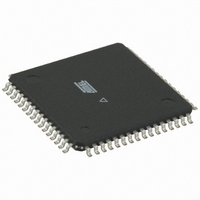ATMEGA128L-8AU Atmel, ATMEGA128L-8AU Datasheet - Page 173

ATMEGA128L-8AU
Manufacturer Part Number
ATMEGA128L-8AU
Description
IC AVR MCU 128K 8MHZ 3V 64TQFP
Manufacturer
Atmel
Series
AVR® ATmegar
Datasheets
1.ATMEGA128-16AU.pdf
(26 pages)
2.ATMEGA128-16AU.pdf
(385 pages)
3.ATMEGA128-16AU.pdf
(389 pages)
Specifications of ATMEGA128L-8AU
Core Processor
AVR
Core Size
8-Bit
Speed
8MHz
Connectivity
EBI/EMI, I²C, SPI, UART/USART
Peripherals
Brown-out Detect/Reset, POR, PWM, WDT
Number Of I /o
53
Program Memory Size
128KB (64K x 16)
Program Memory Type
FLASH
Eeprom Size
4K x 8
Ram Size
4K x 8
Voltage - Supply (vcc/vdd)
2.7 V ~ 5.5 V
Data Converters
A/D 8x10b
Oscillator Type
Internal
Operating Temperature
-40°C ~ 85°C
Package / Case
64-TQFP, 64-VQFP
Cpu Family
ATmega
Device Core
AVR
Device Core Size
8b
Frequency (max)
8MHz
Interface Type
2-Wire/JTAG/USART
Total Internal Ram Size
4KB
# I/os (max)
53
Number Of Timers - General Purpose
4
Operating Supply Voltage (typ)
3.3/5V
Operating Supply Voltage (max)
5.5V
Operating Supply Voltage (min)
2.7V
On-chip Adc
8-chx10-bit
Instruction Set Architecture
RISC
Operating Temp Range
-40C to 85C
Operating Temperature Classification
Industrial
Mounting
Surface Mount
Pin Count
64
Package Type
TQFP
Processor Series
ATMEGA128x
Core
AVR8
Data Bus Width
8 bit
Data Ram Size
4 KB
Maximum Clock Frequency
8 MHz
Number Of Programmable I/os
53
Number Of Timers
4
Operating Supply Voltage
2.7 V to 5.5 V
Maximum Operating Temperature
+ 85 C
Mounting Style
SMD/SMT
3rd Party Development Tools
EWAVR, EWAVR-BL
Minimum Operating Temperature
- 40 C
A/d Inputs
8-Channel, 10-Bit
Cpu Speed
8 MIPS
Eeprom Memory
4K Bytes
Input Output
53
Interface
2-Wire/JTAG/SPI/USART
Memory Type
Flash
Number Of Bits
8
Programmable Memory
128K Bytes
Timers
2-8-bit, 2-16-bit
Voltage, Range
4.5-5.5 V
Controller Family/series
AVR MEGA
No. Of I/o's
53
Eeprom Memory Size
4096Byte
Ram Memory Size
4KB
Rohs Compliant
Yes
For Use With
ATSTK600-TQFP64 - STK600 SOCKET/ADAPTER 64-TQFP770-1007 - ISP 4PORT ATMEL AVR MCU SPI/JTAG770-1005 - ISP 4PORT FOR ATMEL AVR MCU JTAG770-1004 - ISP 4PORT FOR ATMEL AVR MCU SPIATAVRISP2 - PROGRAMMER AVR IN SYSTEMATJTAGICE2 - AVR ON-CHIP D-BUG SYSTEMATSTK501 - ADAPTER KIT FOR 64PIN AVR MCUATSTK500 - PROGRAMMER AVR STARTER KIT
Lead Free Status / RoHS Status
Lead free / RoHS Compliant
Available stocks
Company
Part Number
Manufacturer
Quantity
Price
Company:
Part Number:
ATMEGA128L-8AU
Manufacturer:
MURATA
Quantity:
120 000
Company:
Part Number:
ATMEGA128L-8AU
Manufacturer:
ATM
Quantity:
450
Part Number:
ATMEGA128L-8AU
Manufacturer:
ATMEL/爱特梅尔
Quantity:
20 000
Internal Clock Generation –
The Baud Rate Generator
Double Speed Operation
(U2X)
2467M–AVR–11/04
Signal description:
Internal clock generation is used for the asynchronous and the synchronous master
modes of operation. The description in this section refers to Figure 80.
The USART Baud Rate Register (UBRR) and the down-counter connected to it function
as a programmable prescaler or baud rate generator. The down-counter, running at sys-
tem clock (fosc), is loaded with the UBRR value each time the counter has counted
down to zero or when the UBRRL Register is written. A clock is generated each time the
counter reaches zero. This clock is the baud rate generator clock output (=
fosc/(UBRR+1)). The transmitter divides the baud rate generator clock output by 2, 8, or
16 depending on mode. The baud rate generator output is used directly by the receiver’s
clock and data recovery units. However, the recovery units use a state machine that
uses 2, 8, or 16 states depending on mode set by the state of the UMSEL, U2X and
DDR_XCK bits.
Table 74 contains equations for calculating the baud rate (in bits per second) and for
calculating the UBRR value for each mode of operation using an internally generated
clock source.
Table 74. Equations for Calculating Baud Rate Register Setting
Note:
Some examples of UBRR values for some system clock frequencies are found in Table
82 (see page 194).
The transfer rate can be doubled by setting the U2X bit in UCSRA. Setting this bit only
has effect for the asynchronous operation. Set this bit to zero when using synchronous
operation.
Setting this bit will reduce the divisor of the baud rate divider from 16 to 8, effectively
doubling the transfer rate for asynchronous communication. Note however that the
Operating Mode
Asynchronous Normal Mode
(U2X = 0)
Asynchronous Double Speed
Mode (U2X = 1)
Synchronous Master Mode
txclk
rxclk
xcki
xcko
fosc
BAUD Baud rate (in bits per second, bps)
f
UBRR Contents of the UBRRH and UBRRL Registers, (0 - 4095)
OSC
1. The baud rate is defined to be the transfer rate in bit per second (bps).
Transmitter clock. (Internal Signal)
Receiver base clock. (Internal Signal)
Input from XCK pin (internal Signal). Used for synchronous slave operation.
Clock output to XCK pin (Internal Signal). Used for synchronous master
operation.
XTAL pin frequency (System Clock).
System Oscillator clock frequency
BAUD
BAUD
BAUD
Equation for Calculating
Baud Rate
=
=
=
-------------------------------------- -
16 UBRR
---------------------------------- -
8 UBRR
---------------------------------- -
2 UBRR
(
(
(
f
f
f
OSC
OSC
OSC
(1)
+
+
+
1
1
1
)
)
)
Equation for Calculating
UBRR
UBRR
UBRR
ATmega128
UBRR Value
=
=
=
----------------------- - 1
16BAUD
------------------- - 1
8BAUD
------------------- - 1
2BAUD
f
f
f
OSC
OSC
OSC
–
–
–
173















